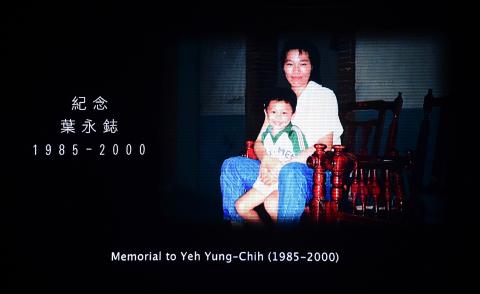Last Friday’s release of the dance video for Jolin Tsai’s (蔡依林) Womxnly (玫瑰少年) — the latest single off her fourteenth album Ugly Beauty (怪美的) — cracked open the song’s significance for a singer long regarded as a gay icon and ally.
The single’s Chinese title, which literally means “Rose Boy,” was the term of endearment for Yeh Yung-chih (葉永鋕), whose death in Apr. 20, 2000 at the age of 15 received national attention.
Prior to his death, Yeh was bullied at school for his perceived effeminate behavior. To avoid harassment, he would use the toilet just before breaktimes, when other students were still in class. When Yeh was found lying in a pool of blood in the toilet of his junior high school in Pingtung County, authorities concluded that a medical condition had caused him to slip and hit his head.

Photo: CNA
Yeh’s mother was critical of the outcome of the investigation and became an LGBTQ advocate. With growing clamor over the circumstances that led to Yeh being alone in the toilet in the first place, the government recalibrated its efforts to understand gender nonconformity and eliminate school bullying.
In December 2000, the Ministry of Education renamed its Gender Equity Education Committee (性別平等教育委員會), reflecting a substantive shift away from a gender binary framework to a more holistic understanding of gender. In June 2004, the Gender Equity Education Act (性別平等教育法) came into force.
The impact of Yeh’s life and death has had years to permeate through Tsai’s artistry, going back to her decision to screen a five-minute documentary featuring Yeh’s mother during her 2015 concert series. It is telling that Womxnly is the only track on Ugly Beauty where Tsai is credited as lead writer. Her lyrics are equal part earnest comfort (“Boy or girl, you can be whichever you want”) and sass (“A life in rosy hues shall be / The cold dish of revenge we serve the haters”) arranged over a very danceable electronic beat.

Photo: Pan Shao-tang, Liberty Times
New Zealand choreographer Kiel Tutin leads Tsai and her dancers through clever costume changes and contrasting facial expressions to embody an individual breaking out of society’s constraints into self-acceptance.
“The song says that regardless of gender, there is no established framework for gender identity,” Tutin wrote on Instagram.
Tsai has never relegated her support for the LGBTQ community to subtext. Most controversially, she and actress Ruby Lin (林心如) played a same-sex couple in the video for her 2014 single We’re All Different, Yet the Same (不一樣又怎樣). In less trustworthy hands, casting two apparently heterosexual women in that role would be criticized as lesbian-baiting. But Tsai only endeared herself to the LGBTQ community with the video’s storyline, which humanized the struggles faced by same-sex partners whose unions are not legally recognized.
It is rare, even in countries with robust civic discourse on human rights and identity politics, for mainstream interpretations of LGBTQ rights to be done well and with respect. Tsai is proving to be a virtuoso, down to the very progressive spelling of Womxnly, a term designed to include marginalized and intersectional groups such as trans women.

April 14 to April 20 In March 1947, Sising Katadrepan urged the government to drop the “high mountain people” (高山族) designation for Indigenous Taiwanese and refer to them as “Taiwan people” (台灣族). He considered the term derogatory, arguing that it made them sound like animals. The Taiwan Provincial Government agreed to stop using the term, stating that Indigenous Taiwanese suffered all sorts of discrimination and oppression under the Japanese and were forced to live in the mountains as outsiders to society. Now, under the new regime, they would be seen as equals, thus they should be henceforth

Last week, the the National Immigration Agency (NIA) told the legislature that more than 10,000 naturalized Taiwanese citizens from the People’s Republic of China (PRC) risked having their citizenship revoked if they failed to provide proof that they had renounced their Chinese household registration within the next three months. Renunciation is required under the Act Governing Relations Between the People of the Taiwan Area and the Mainland Area (臺灣地區與大陸地區人民關係條例), as amended in 2004, though it was only a legal requirement after 2000. Prior to that, it had been only an administrative requirement since the Nationality Act (國籍法) was established in

Three big changes have transformed the landscape of Taiwan’s local patronage factions: Increasing Democratic Progressive Party (DPP) involvement, rising new factions and the Chinese Nationalist Party’s (KMT) significantly weakened control. GREEN FACTIONS It is said that “south of the Zhuoshui River (濁水溪), there is no blue-green divide,” meaning that from Yunlin County south there is no difference between KMT and DPP politicians. This is not always true, but there is more than a grain of truth to it. Traditionally, DPP factions are viewed as national entities, with their primary function to secure plum positions in the party and government. This is not unusual

US President Donald Trump’s bid to take back control of the Panama Canal has put his counterpart Jose Raul Mulino in a difficult position and revived fears in the Central American country that US military bases will return. After Trump vowed to reclaim the interoceanic waterway from Chinese influence, US Defense Secretary Pete Hegseth signed an agreement with the Mulino administration last week for the US to deploy troops in areas adjacent to the canal. For more than two decades, after handing over control of the strategically vital waterway to Panama in 1999 and dismantling the bases that protected it, Washington has